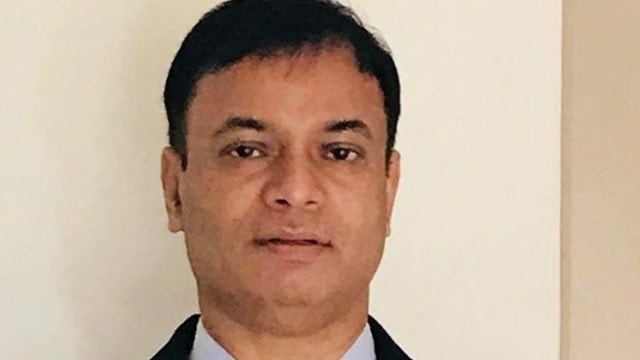Only use trusted apps and platforms. If something feels off, verify: Haryana IPS officer OP Singh on preventing cyber frauds
Haryana State Narcotics Control Bureau head OP Singh says several factors have made armed forces personnel, both serving and retired, prime targets for cyber fraudsters.
 Singh is the head of the Haryana State Narcotics Control Bureau (HSNCB). (Express Photo)
Singh is the head of the Haryana State Narcotics Control Bureau (HSNCB). (Express Photo)O P Singh, a 1992-batch Haryana cadre IPS officer, has led one of the country’s most intense campaigns against narcotics and cyber fraud by combining strong enforcement with creative public outreach.
In a conversation with The Indian Express, Singh, who is the head of the Haryana State Narcotics Control Bureau (HSNCB), talks about dismantling drug networks, tackling AI-driven scams, and why public participation is at the heart of lasting change.
Edited excerpts:
Q. Why are cyber fraudsters increasingly targeting armed forces personnel in recent times?
Singh: Armed forces personnel, both serving and retired, have become prime targets for cyber fraudsters due to a combination of factors. Their disciplined nature, trust in authority, and limited exposure to civilian financial systems make them susceptible to manipulation. Fraudsters exploit these traits by impersonating officials or creating scenarios that invoke fear of legal consequences.
For instance, in a recent case from Haryana’s Faridabad, a retired Army officer was duped of ₹5 lakh in a ‘digital arrest’ scam. The fraudsters posed as officials from the Telecom Regulatory Authority of India (TRAI) and the Central Bureau of Investigation (CBI), accusing him of involvement in illegal activities and coercing him into transferring funds under the pretext of clearing his name.
In another incident in Panchkula, a retired major general was defrauded of over ₹82 lakh. The scammers, posing as police personnel, placed him under ‘digital arrest’ and coerced him into transferring money into a bank account registered in Surat, Gujarat.
These incidents highlight the need for increased awareness and vigilance among armed forces personnel. It’s crucial for them to verify the identity of callers, avoid sharing personal information over unsolicited calls, and report suspicious activities to the authorities promptly.
To report cyber frauds, individuals can call the national cybercrime helpline at 1930 or file a complaint online through the National Cyber Crime Reporting Portal. Prompt reporting can significantly increase the chances of recovering lost funds and preventing further victimisation.
Q. Have cyber frauds gone up in recent years? What factors contribute to this rise?
Singh: It has. The reasons are clear—widespread smartphone use, poor digital literacy, and oversharing of personal details online. What’s changed is how advanced the frauds have become. We’re seeing voice cloning, fake customer service numbers, and AI-based deception. It’s a new level of sophistication.
Q. What are the most effective strategies to prevent cyber fraud?
Singh: Awareness is the first step. We conduct digital safety sessions in schools and colleges. On the enforcement side, our 1930 cyber helpline allows victims to report scams in real time, which helps us freeze or reverse transactions quickly. We also coordinate closely with banks and telecom service providers.
Q. What precautions should individuals take when conducting online transactions?
Singh: Only use trusted apps and platforms. Don’t click on unknown links or scan random QR codes. Never share your OTP, PIN, or account details over the phone or message. Enable two-factor authentication. If something feels off, stop and verify. A few seconds of caution can save you from months of damage.
Q. Among the available options, which mode of online transactions is the safest and most reliable?
Singh: UPI is among the safest when used via official apps with proper security. Most frauds occur when users are tricked into scanning fake QR codes or authorising “collect” requests. The system is sound; the threat lies in social engineering.
Q. What role can parents play in protecting children from drug exposure and addiction?
Singh: They need to stay involved. Notice if there are sudden mood shifts or increased efforts to hide actions, or a noticeable drop in academic performance. Build trust and communicate openly. Act early if you notice signs of trouble in someone’s behaviour or situation. The state has expanded access to de-addiction and counselling facilities; use them.
Q. What does the drug situation in Haryana look like right now?
Singh: Very serious, but we’re making headway. From January 1 to April 18 this year, we registered as many as 1,038 cases under the Narcotic Drugs and Psychotropic Substances (NDPS) Act, apart from arresting 1,597 accused, and seizing over 21 kg of heroin, 591 kg of charas, 1,426 kg of ganja, and nearly 4 lakh tablets. We’ve also attached properties, demolished 111 illegal structures, and initiated action against habitual offenders involved in drug-related crimes.
Q. How can the common man contribute to curbing drug abuse?
Singh: Report what you see. You don’t have to intervene directly — just share the information. Call our helplines: 90805-91805 or 1933, or use the MANAS portal to report anonymously. Every tip helps. You can also support awareness drives and youth engagement programs in your area.
Q. What makes Haryana State Narcotics Control Bureau’s anti-drug campaigns unique?
Singh: We have focused on emotional and cultural connection. ‘Namak Lota Jatha’ is a symbolic cycle rally where people carry salt pots and pledge a drug-free life. ‘Ram Gurukul Gaman’ takes traditional learning into schools. ‘Chakravyuh’ uses real-life role play to show how peer pressure works. The ‘Bucket Challenge’ has gone viral on social media, encouraging youth to commit publicly to a clean lifestyle. We’re also recognising Drug-Free Villages and Wards to make communities part of the solution.
Q. What initiatives have the Haryana Police undertaken to improve engagement between law enforcement and the public?
Singh: We have focused on access and transparency. Programmes like Raahgiri, school outreach, and grievance redressal events have created regular police-public touchpoints. We’re also responsive on social media, not just for updates, but for real help. Public trust is crucial, and it’s being rebuilt, step by step.








